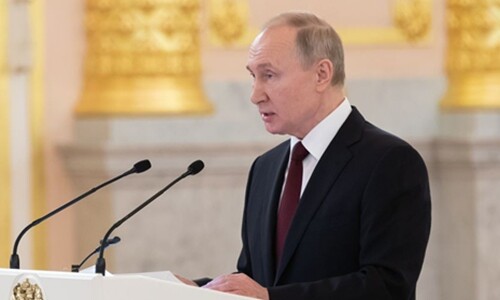Cui Heng:Russian people have final say over constitutional amendments
source:GLOBAL TIMES
Reprint links:http://enapp.globaltimes.cn/?from=singlemessage&isappinstalled=0#/article/1182397

Russian President Vladimir Putin speaks at the ceremony of presenting credentials at the Kremlin in Moscow, Russia, on February 5. Photo: Xinhua
On Wednesday, Russia's parliament approved constitutional amendments that include the possibility of President Vladimir Putin extending his rule for another two terms. Putin has adopted an ambiguous attitude toward his possible re-election. The constitutional amendments and Putin's vague manner have offered room for speculation. International pundits have already suggested the possibility of Putin ruling until 2036.
The West has long criticized Putin for strengthening Russia's authoritarian rule, and deviating from the country's democratic process established in the 1990s, which had set presidential term limits to two. Some have even labeled Putin a tsar-style autocrat. The amendments are contrary to the state of union address made by Putin at the beginning of the year. In his state of the union address Putin unveiled plans to recalibrate power structure via constitutional reforms. The constitutional amendments aim to strengthen presidential power.
How Russia changes its Constitution and whether Putin seeks re-election should not be judged by Western democratic standards. The key is whether these systematic changes fit Russia's situation and people's needs.
Although international opinion has always been critical of Putin, the West has to admit that Russia has achieved stability and economic recovery during the 20 years of Putin's rule. Putin took over a shambles of a country created by neoliberalism-guided reforms in the 1990s.
The Russian people know they are better off than they were a couple of decades ago and this is why Putin has remained popular for so long. Prior to the 2012 presidential election, Putin's support was wavering. But when Russians were asked about the future of their country without Putin, they began to realize that their president was irreplaceable.
The results of the constitutional referendum on April 22 will show if the Russian people still believe Putin is irreplaceable. Putin has said the Constitutional amendments need the approval of the constitutional court and the Russian people.
If the amendments are approved, Putin's presidency will have renewed legitimacy. If the amendments are voted down, it will require Putin to make a different arrangement during his remaining four years in office.
From the perspective of Russia's national development, Russia needs a strong leader. Since the Ukraine crisis, Russia has suffered through a protracted economic downturn. The recent sharp drop in oil prices and devaluation of the Russian ruble has further increased uncertainty over the Russian economy. Putin once proposed to make Russia the world's fifth largest economy, but it seems the difficulties in reaching the goal are growing. It is now the 11th largest, behind Canada's.
According to Putin's 2020 Presidential Address to the Federal Assembly, Moscow will carry out large-scale national projects, "whose implementation will require a new quality of state governance," to stimulate economic growth. A strong leader is obviously needed to ensure such tasks are well implemented.
Throughout Russia's political circle, few elites other than Putin can balance the interests of all parties and resolutely complete the national development strategy.
April 22 will witness the Russian people's final choice. Who is suitable for the position depends on the needs of the country and the wishes of the people. Whether democracy is a better system depends on the soil in which it grows and the tasks that are at hand. The practices of various countries in dealing with the coronavirus demonstrate the disadvantages of excessive devolution of powers within a country in its ability to respond to major crises.
Russia is now beset with troubles internally and externally. Such a situation calls for a strong leader to lead the country to become a powerful state. If the Russian people choose to keep Putin in power, what's the point of discussion whether the decision goes against democracy?
Some analysts also suspect that Putin has found a successor, and amending the Constitution will pave the way for the next president. If this is indeed the case, the West's criticism of Putin would have been without merit. As the Chinese government put it, we should respect and support the Russian people's choice.
The author is a post-doctorate researcher from the Centre for Russian Studies, East China Normal University. opinion@globaltimes.com.cn
